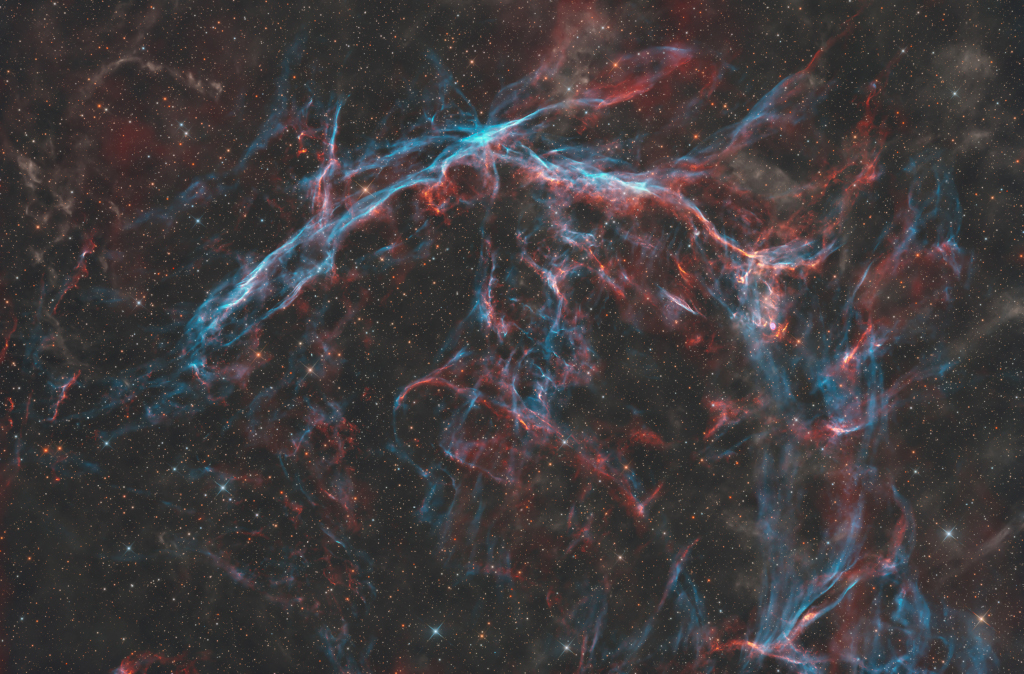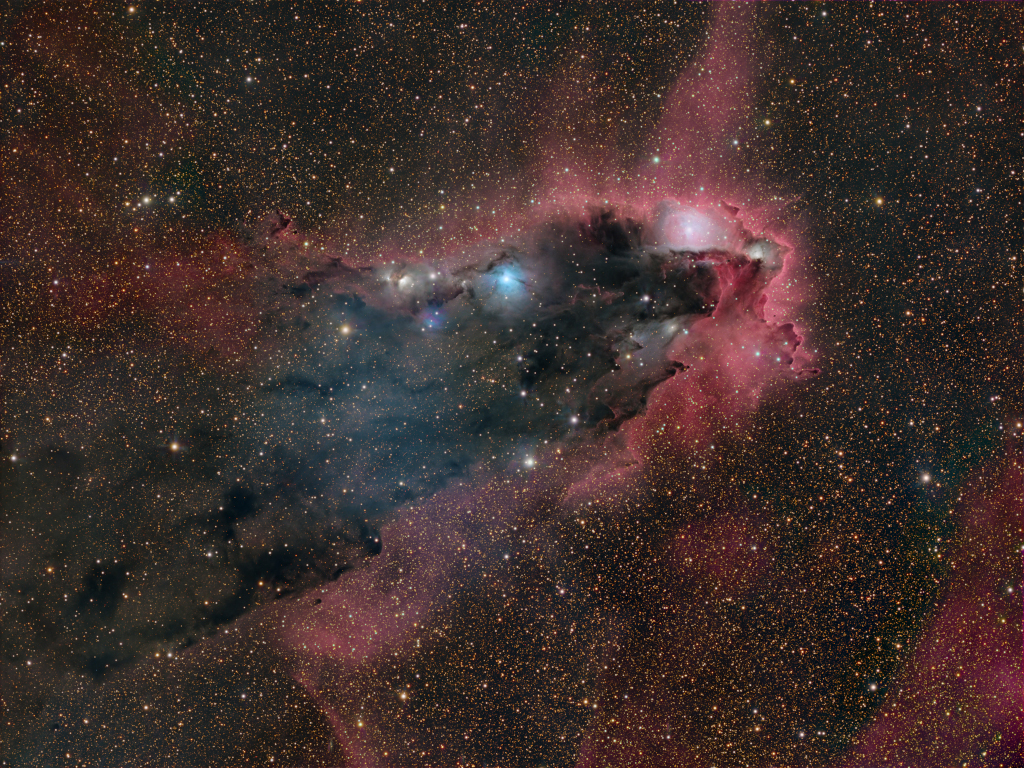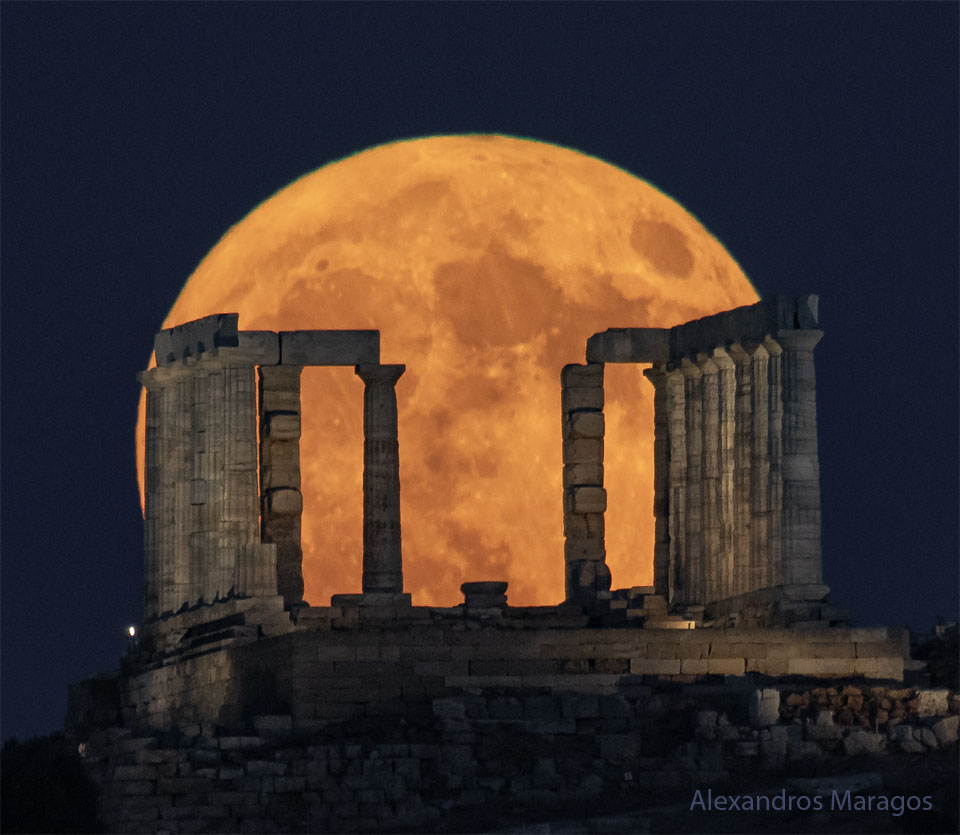Blog
Erev Shabbat Service Friday August 23rd with Inbal Sharett-Singer, Jayson Rodovsky, Jeff Bailey, Pete Whitman and mick laBriola.
more...
There is a quiet pulsar at the heart of CTA 1. The supernova remnant was discovered as a source of emission at radio wavelengths by astronomers in 1960 and since identified as the result of the death explosion of a massive star. But no radio pulses were detected from the expected pulsar, the rotating neutron star remnant of the massive star’s collapsed core. Seen about 10,000 years after the initial supernova explosion, the interstellar debris cloud is faint at optical wavelengths. CTA 1’s visible wavelength emission from still expanding shock fronts is revealed in this deep telescopic image, a frame that spans about 2 degrees across a starfield in the northern constellation of Cepheus. While no pulsar has since been found at radio wavelengths, in 2008 the Fermi Gamma-ray Space Telescope detected pulsed emission from CTA 1, identifying the supernova remnant’s rotating neutron star. The source has been recognized as the first in a growing class of pulsars that are quiet at radio wavelengths but pulse in high-energy gamma-rays. 4600ly.

more...
Keith John Moon (23 August 1946 – 7 September 1978) was an English musician who was the drummer for the rock band the Who. Regarded as one of the greatest drummers in the history of rock music, he was noted for his unique style of playing and his eccentric, often self-destructive behaviour.
Moon grew up in Wembley and took up the drums during the early 1960s. After playing with a local band, the Beachcombers, he joined the Who in 1964 before they recorded their first single. Moon was recognised for his drumming style, which emphasised tom-toms, cymbal crashes, and drum fills. Throughout his tenure with the Who, his drum kit steadily grew in size, and (along with Ginger Baker) he has been credited as one of the earliest rock drummers to regularly employ double bass drums in his setup. Moon occasionally collaborated with other musicians and later appeared in films, but considered playing in the Who his primary occupation, and remained a member of the band until his death. In addition to his talent as a drummer, Moon developed a reputation for smashing his kit on stage and destroying hotel rooms on tour. He was fascinated with blowing up toilets with cherry bombs or dynamite, and destroying television sets. Moon also enjoyed touring and socialising, and became bored and restless when the Who were inactive. His 21st birthday party in Flint, Michigan, has been cited as a notorious example of decadent behaviour by rock groups.
Moon suffered a number of setbacks during the 1970s, most notably the accidental death of chauffeur Neil Boland and the breakdown of his marriage. He suffered from alcoholism and acquired a reputation for decadence and dark humour; his nickname was “Moon the Loon”. While touring with the Who, on several occasions he passed out on stage and was hospitalised. By the time of their final tour with him in 1976, and particularly during production of The Kids Are Alright and Who Are You, the drummer’s deterioration was evident. Moon moved back to London from Los Angeles in 1978, dying that September from an overdose of clomethiazole, a drug intended to treat or prevent symptoms of alcohol withdrawal.
Moon’s drumming continues to be praised by critics and musicians. He was posthumously inducted into the Modern Drummer Hall of Fame in 1982, becoming the second rock drummer to be chosen, and in 2011 he was voted the second-greatest drummer in history by a Rolling Stone readers’ poll. Moon was inducted into the Rock and Roll Hall of Fame in 1990 as a member of the Who. On 6 September, Moon and Walter-Lax were guests of Paul and Linda McCartney at a preview of a film, The Buddy Holly Story. After dining with the McCartneys at Peppermint Park in Covent Garden, Moon and Walter-Lax returned to their flat. He watched a film (The Abominable Dr. Phibes), and asked Walter-Lax to cook him lamb cutlets (which Walter-Lax had stated was his favourite meal). When she objected, Moon replied, “If you don’t like it, you can fuck off!” These were his last words. Moon then took some clomethiazole tablets. When Walter-Lax checked on him the following afternoon, she discovered he was dead.
more...Terje Rypdal (born 23 August 1947) is a Norwegian guitarist and composer. He has been an important member in the Norwegian jazz community, and has also given show concerts with guitarists Ronni Le Tekrø and Mads Eriksen as “N3”.
Rypdal was born in Oslo, Norway, the son of a composer and orchestra leader. He studied classical piano and trumpet as a child, and then taught himself to play guitar as he entered his teens. Starting out as a Hank Marvin-influenced rock guitarist with The Vanguards, Rypdal turned towards jazz in 1968 and joined Jan Garbarek‘s group and later George Russell‘s sextet and orchestra. An important step towards international attention was his participation in the free jazz festival in Baden-Baden, Germany, in 1969, where he was part of a band led by Lester Bowie. During his musical studies at Oslo university and conservatory, he led the orchestra of the Norwegian version of the musical Hair. He has often been recorded on the ECM record label, both jazz-oriented material and classical compositions (some of which do not feature Rypdal’s guitar).
His compositions “Last Nite” and “Mystery Man” were featured in the Michael Mann film Heat, and included on the soundtrack of the same name.
more...The essential form of soleares is the essential form for many palos:
1) A guitar introduction that sets the mood, key and tempo of the piece.
2) A temple/salida, in which the singer uses simple syllables to tune into the guitar and fix the tempo.
3) Two or three sung letras, generally interspersed with falsetas by the guitarist.
4) If a dancer is part of the performance, the dancer will interpret the letras lyyically and rhythmically, and will perform an escobilla or even several escobillas, footwork sections at a faster tempo, accompanied by a standardized series of arpeggios on the guitar.
5) A dance, guitar or cante performance may also include a macho, a transition to a faster form with the same basic underlying compás. It is a common practice to transition directly into bulerías, or to soléa por bulerías transitioning into bulerías
more...In silhouette against a crowded star field along the tail of the arachnological constellation Scorpius, this dusty cosmic cloud evokes for some the image of an ominous dark tower. In fact, monstrous clumps of dust and molecular gas collapsing to form stars may well lurk within the dark nebula, a structure that spans almost 40 light-years across this gorgeous telescopic portrait. A cometary globule, the swept-back cloud is shaped by intense ultraviolet radiation from the OB association of very hot stars in NGC 6231, off the upper right corner of the scene. That energetic ultraviolet light also powers the globule’s bordering reddish glow of hydrogen gas. Hot stars embedded in the dust can be seen as bluish reflection nebulae. This dark tower and associated nebulae are about 5,000 light-years away.

more...
Delmar Allen “Dale” Hawkins (August 22, 1936 – February 13, 2010) was a pioneer American rock singer, songwriter, and rhythm guitarist who was often called the architect of swamp rock boogie.
He began recording in 1956. In 1957, Hawkins was playing at Shreveport, Louisianaclubs, and although his music was influenced by the new rock and roll style of Elvis Presley and the guitar sounds of Scotty Moore, Hawkins blended that with the uniquely heavy blues sound of black Louisiana artists for his recording of his swamp-rock classic, “Susie Q.” Fellow Louisiana guitarist and future Rock and Roll Hall of Famer James Burton provided the signature riff and solo.
more...Malachi Favors (August 22, 1927 – January 30, 2004) was an American jazz bassist who played with the Art Ensemble of Chicago.
“Favors’s tendency to dissemble about his age was a well-known source of mirth to fellow musicians of his generation”. Most reference works give his year of birth of 1937, but, following his death, his daughter stated that it was 1927.
Favors primarily played the double bass, but also played the electric bass guitar, banjo, zither, gong, and other instruments. He began playing double bass at the age of 15 and began performing professionally upon graduating from high school. Early performances included work with Dizzy Gillespie and Freddie Hubbard. By 1965, he was a founder of the Association for the Advancement of Creative Musicians and a member of Muhal Richard Abrams‘ Experimental Band.
At some point he added the word “Maghostut” to his name and because of this he is commonly listed as “Malachi Favors Maghostut”. Musically he is most associated with bebop, hard bop, and particularly free jazz.
more...Sonny Thompson (probably August 23, 1916 – August 11, 1989), born Alfonso Thompson or Hezzie Tompson, was an American R&B bandleader and pianist, popular in the 1940s and 1950s.
There is some uncertainty over Thompson’s origins, as well as his birth name. Researchers Bob Eagle and Eric LeBlanc indicate that he was born in 1916 in Wilkinson County, Mississippi, but other sources state that he was born in 1923, either in Mississippi or in Chicago.
more...John Lee Hooker (August 22, 1912 or 1917 – June 21, 2001 Clarksdale, MS) was an American blues singer, songwriter, and guitarist. The son of a sharecropper, he rose to prominence performing an electric guitar-style adaptation of Delta blues that he developed in Detroit. Hooker often incorporated other elements, including talking blues and early North Mississippi hill country blues. He developed his own driving-rhythm boogie style, distinct from the 1930s–1940s piano-derived boogie-woogie. Hooker was ranked 35 in Rolling Stone‘s 2015 list of 100 greatest guitarists, and has been cited as one of the greatest male blues vocalists of all time.
Some of his best known songs include “Boogie Chillen’” (1948), “Crawling King Snake” (1949), “Dimples” (1956), “Boom Boom” (1962), and “One Bourbon, One Scotch, One Beer” (1966). Several of his later albums, including The Healer (1989), Mr. Lucky (1991), Chill Out (1995), and Don’t Look Back (1997), were album chart successes in the U.S. and UK. The Healer (for the song “I’m in the Mood”) and Chill Out (for the album) both earned him Grammy wins, as well as Don’t Look Back, which went on to earn him a double-Grammy win for Best Traditional Blues Recording and Best Pop Collaboration with Vocals (with Van Morrison).
more...(Achille) Claude Debussy ( 22 August 1862 – 25 March 1918) was a French composer. He is sometimes seen as the first Impressionist composer, although he vigorously rejected the term. He was among the most influential composers of the late 19th and early 20th centuries.
Born to a family of modest means and little cultural involvement, Debussy showed enough musical talent to be admitted at the age of ten to France’s leading music college, the Conservatoire de Paris. He originally studied the piano, but found his vocation in innovative composition, despite the disapproval of the Conservatoire’s conservative professors. He took many years to develop his mature style, and was nearly 40 when he achieved international fame in 1902 with the only opera he completed, Pelléas et Mélisande.
Debussy’s orchestral works include Prélude à l’après-midi d’un faune (1894), Nocturnes (1897–1899) and Images (1905–1912). His music was to a considerable extent a reaction against Wagner and the German musical tradition. He regarded the classical symphony as obsolete and sought an alternative in his “symphonic sketches”, La mer (1903–1905). His piano works include sets of 24 Préludes and 12 Études. Throughout his career he wrote mélodies based on a wide variety of poetry, including his own. He was greatly influenced by the Symbolist poetic movement of the later 19th century. A small number of works, including the early La Damoiselle élue and the late Le Martyre de saint Sébastien have important parts for chorus. In his final years, he focused on chamber music, completing three of six planned sonatas for different combinations of instruments.
With early influences including Russian and Far Eastern music and works by Chopin, Debussy developed his own style of harmony and orchestral colouring, derided – and unsuccessfully resisted – by much of the musical establishment of the day. His works have strongly influenced a wide range of composers including Béla Bartók, Olivier Messiaen, George Benjamin, and the jazz pianist and composer Bill Evans. Debussy died from cancer at his home in Paris at the age of 55 after a composing career of a little more than 30 years.
more...Art HaynesMusicianMusical Director
OCCUPATION: MUSIC PRODUCER, WRITER, ARRANGER,
PRODUCTION, STUDIO MUSICIAN, LIVE PERFORMER,
AND EDUCATOROMAHA NEBRASKA NATIVE ARTHUR
HAYNES (ART) BRINGS MULTI-INSTRUMENTALIST
VERSATILITY TO ANY GENRE OF MUSIC, SPANNING FROM
R&B, JAZZ, GOSPEL, ROCK, TO Multi-CULTURAL STYLES AS
WELL.ART HAS AN INSTRUMENTAL BACKGROUND THAT
INCLUDES: BASS, UPRIGHT BASS, DRUMS, KEYBOARDS,
GUITAR, PERCUSSIONS AND MANY MORE.SINCE THE
MID-SEVENTIES ART MADE THE TWIN CITIES HOME
AND HAS ENJOYED MANY FRUITFUL YEARS HERE. ART
HAS WORKED AND SHARED HIS TALENT WITH MANY OF
THE MINNEAPOLIS SOUND SOURCES AND RESOURCES.
OVER THESE YEARS HE HAS HAD PERFORMANCES AND
HAS RECORDED AT PAISLEY PARK AND WITH FLYTE
TYME. HE HAS ALSO PERFORMED OR TOURED WITH
GROUPS and Members of Groups, SUCH AS ALEXANDER
ONEAL, CHERELLE, JESSE JOHSON, THE JETS, PEBBLES,
MAZARATI, THE GIRLS, TAMARA AND THE SEEN,
MEMBERS OF THE REVOLUTION, THE TIME, MINT
CONDITION, LO KEY, NEXT, KOOL SKOOL ,The Minnesota
Orchestra AND OTHERS. ART HAS ALSO PREVIOUSLY
BEEN MUSICAL DIRECTOR FOR ALEXANDER ONEAL,
CHERRELLE AND IS CURRENTLY DIRECTING AT THE
PRESENT.

A supermoon occurred yesterday 8-19-24. And tonight’s moon should also look impressive. Supermoons appear slightly larger and brighter than most full moons because they reach their full phase when slightly nearer to the Earth — closer than 90 percent of all full moons. This supermoon was also a blue moon given the definition that it is the third of four full moons occurring during a single season. Blue moons are not usually blue, and a different definition holds that a blue moon is the second full moon that occurs during a single month. The featured image captured the blue supermoon right near its peak size yesterday as it was rising beyond the Temple of Poseidon in Greece. This supermoon is particularly unusual in that it is the first of four successive supermoons, the next three occurring in September, October, and November.

Clydie Mae King (August 21, 1943 – January 7, 2019) was an American singer, best known for her session work as a backing vocalist. King also recorded solo under her name. In the 1970s, she recorded as Brown Sugar, and her single “Loneliness (Will Bring Us Together Again)” reached No. 44 on the Billboard R&B charts in 1973.
King was born in Dallas, Texas, and following her mother’s death when she was two years old, she was raised by her older sister, Lula Mae Crittendon. After starting to sing in the local church, she moved with her family to Los Angeles in the early 1950s.Discovered by songwriter Richard Berry, King began her recording career in 1956 with Little Clydie and the Teens. She was a member of Ray Charles‘ Raelettes for three years and contributed to early 1960s recordings by producer Phil Spector, such as “River Deep – Mountain High. She recorded solo singles for Specialty Records, Kent Records and others. Her 1971 solo single “‘Bout Love” reached No. 45 on the R&B chart. Reviewing her 1972 debut album Direct Me, Robert Christgau wrote in Christgau’s Record Guide: Rock Albums of the Seventies (1981): “Clydie has a voice that’s more sly Diana than robust Martha and addresses the title plea to Gabriel Mekler, who (this time, anyway) proves neither as sly nor as robust as Berry Gordy.
more...Steven Bruce Smith (born August 21, 1954 Whitman, MA) is an American drummer best known as a member of the rock band Journey across three stints: 1978 to 1985, 1995 to 1998 and 2015 to 2020. Modern Drummer magazine readers have voted him the No. 1 All-Around Drummer five years in a row. In 2001, the publication named Smith one of the Top 25 Drummers of All Time, and in 2002 he was voted into the Modern Drummer Hall of Fame. He was inducted into the Rock and Roll Hall of Fame as a member of Journey on April 7, 2017.
more...
Arthur Stewart Farmer (August 21, 1928 – October 4, 1999 Council Bluffs, IA) was an American jazztrumpeter and flugelhorn player. He also played flumpet, a trumpet–flugelhorn combination especially designed for him. He and his identical twin brother, double bassist Addison Farmer, started playing professionally while at high school in Los Angeles. Art gained greater attention after the release of a recording of his composition “Farmer’s Market” in 1952. He subsequently moved from Los Angeles to New York, where he performed and recorded with musicians such as Horace Silver, Sonny Rollins, and Gigi Gryce and became known principally as a bebop player.
As Farmer’s reputation grew, he expanded from bebop into more experimental forms through working with composers such as George Russell and Teddy Charles. He went on to join Gerry Mulligan‘s quartet and, with Benny Golson, to co-found the Jazztet. Continuing to develop his own sound, Farmer switched from trumpet to the warmer flugelhorn in the early 1960s, and he helped to establish the flugelhorn as a soloist’s instrument in jazz. He settled in Europe in 1968 and continued to tour internationally until his death. Farmer recorded more than 50 albums under his own name, a dozen with the Jazztet, and dozens more with other leaders. His playing is known for its individuality – most noticeably, its lyricism, warmth of tone and sensitivity.
more...William James “Count” Basie (August 21, 1904 – April 26, 1984 Red Bank, NJ) was an American jazz pianist, organist, bandleader, and composer. In 1935, he formed the Count Basie Orchestra, and in 1936 took them to Chicago for a long engagement and their first recording. He led the group for almost 50 years, creating innovations like the use of two “split” tenor saxophones, emphasizing the rhythm section, riffing with a big band, using arrangers to broaden their sound, his minimalist piano style, and others. Many musicians came to prominence under his direction, including the tenor saxophonists Lester Young and Herschel Evans, the guitarist Freddie Green, trumpeters Buck Clayton and Harry “Sweets” Edison, plunger trombonist Al Grey, and singers Jimmy Rushing, Helen Humes, Thelma Carpenter, and Joe Williams. As a composer, Basie is known for writing such jazz standards as Blue and Sentimental, Jumpin’ at the Woodside and One O’Clock Jump.
more...More Posts
- Juice Wilson
- World Music with WÖR
- Daily Roots with Fulk Livingston Reid
- Surviving the Pandemic and Realizing Racial Justice
- The Cosmos with M51
- Jeff Tain Watts
- Jimmy Cobb
- Leadbelly
- World Music with Duo Coincidencia
- Daily Roots with Bob Marley
- CONGRATULATIONS AMERICA Trumps Last Day in Office
- Surviving the Pandemic and Realizing Racial Justice
- The Cosmos with MGTC J095959.63+024608.6
- Robert Palmer
- Janis Joplin
- Horace Parlan
- Henry Gray
- World Music with Ali Baba Cissé
- Daily Roots with mick laBriola
- MLK 2021